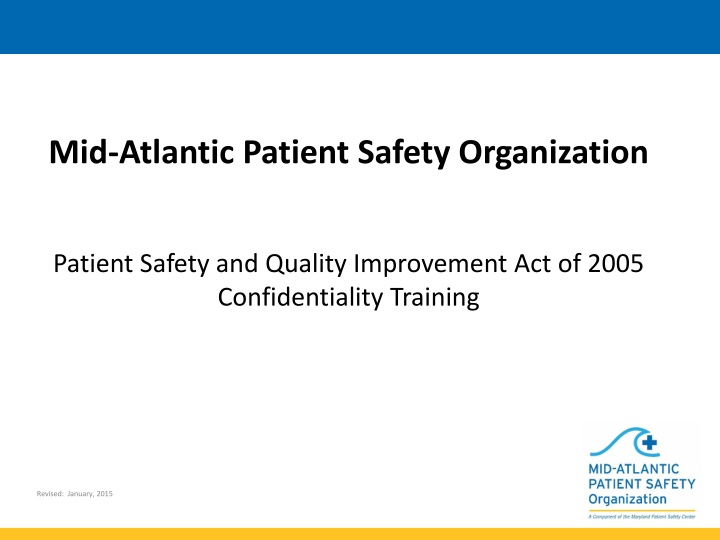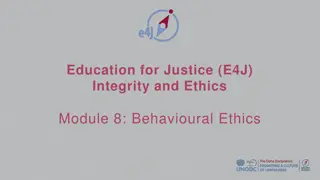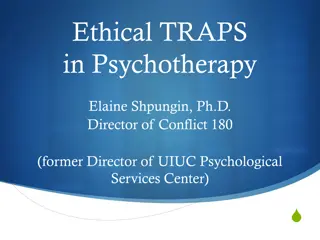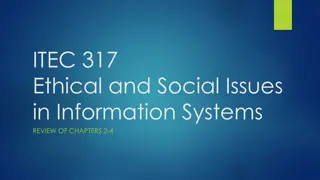Consulting Ethics and Ethical Principles in IS6602
Ethical issues in consulting are crucial for consultants to navigate effectively. This seminar delves into the fundamentals of ethics, emphasizing the importance of situational competence, confidentiality, and other key principles.
Download Presentation

Please find below an Image/Link to download the presentation.
The content on the website is provided AS IS for your information and personal use only. It may not be sold, licensed, or shared on other websites without obtaining consent from the author.If you encounter any issues during the download, it is possible that the publisher has removed the file from their server.
You are allowed to download the files provided on this website for personal or commercial use, subject to the condition that they are used lawfully. All files are the property of their respective owners.
The content on the website is provided AS IS for your information and personal use only. It may not be sold, licensed, or shared on other websites without obtaining consent from the author.
E N D
Presentation Transcript
Mid-Atlantic Patient Safety Organization Patient Safety and Quality Improvement Act of 2005 Confidentiality Training Revised: January, 2015
Training Overview The Patient Safety and Quality Improvement Act of 2005 (Patient Safety Act) encourages health care providers to share quality and medical error information to improve the quality and safety of health care delivery without fear of legal discovery or without tarnishing their professional reputations. The Patient Safety Act requires that Patient Safety Work Product (PSWP) be confidential and not be disclosed by anyone holding the PSWP, except as permitted by law. www.marylandpatientsafety.org 2
Training Objectives To identify: What is Patient Safety Work Product Exactly what information is confidential What disclosures are prohibited What disclosures are permitted To understand the penalties for unauthorized disclosure www.marylandpatientsafety.org 3
Who is Affected by the Confidentiality Requirement? Any health care provider or hospital work force who has or may have access to: Patient Safety Work Product; Patient Safety Evaluation System; or Recommendations from the PSO. www.marylandpatientsafety.org 4
Confidentiality Protections Permit providers within a hospital or hospital system to share protected quality information to improve quality of care and for other purposes; Unless all providers identified in the PSWP agree to disclose the PSWP, the protections cannot be waived; Dovetails with HIPAA privacy rule but also protects information about the person who reported the quality information, the health care providers involved, and the institution; May be strengthened by the hospital and disclosures may be delegated to contractors; State laws may provide greater confidentiality protections. www.marylandpatientsafety.org 5
Acronyms and Terms in Patient Safety Act PSO = Patient Safety Organization PSES = Patient Safety Evaluation System PSWP = Patient Safety Work Product Non-Identifiable PSWP www.marylandpatientsafety.org 6
PSWP The Confidential Data PSWP is: Any data, reports, records, memoranda, analysis (such as Root Cause Analyses), or written or oral statements (or copies of any of this material) which could improve patient safety, health care quality, or health care outcomes; And that: Are assembled or developed by a provider for reporting to a PSO and are reported to a PSO, which includes information that is documented as within a PSES for reporting to a PSO, and such documentation includes the data the information entered the PSES; or Are developed by a PSO for the conduct of patient safety activities; or Which identify or constitute the deliberations or analysis of, or identify the fact of reporting pursuant to, a PSES. PSWP is privileged from administrative, disciplinary, civil, and criminal proceedings and is confidential PSWP may be Personal Health Information (PHI) under HIPAA and subject to other privacy and security regulations. www.marylandpatientsafety.org 7
PSWP What is NOT Patient s medical record, billing and discharge information, or any other original patient or provider information. Information that is collected, maintained, or developed separately, or exists separately, from a PSES (e.g., developed for credentialing). PSWP assembled by a provider for reporting to a PSO but removed from a PSES is no longer PSWP if: The information had not yet been reported to a PSO; and Provider documents the act and date of removal of such information from the PSES. www.marylandpatientsafety.org 8
Patient Safety Evaluation System Exists anywhere that patient safety activities occur in a health care entity and includes the process of collection, management, or analysis of information for reporting to or by a PSO (CFR Part 3.20 (b)(2)) Determines which data collected for the PSO is actually sent to the PSO and becomes PSWP. PSES analysis to determine which data sent to the PSO is protected from discovery as PSWP. www.marylandpatientsafety.org 9
What Happens in the PSES Determines what information to collect to improve patient safety, health care quality, and healthcare outcomes (may be targeted initiatives). Reviews data for trends and recommends action when needed to mitigate harm or improve care. Analyzes data and makes recommendations to continuously improve patient safety, healthcare quality, and healthcare outcomes. Conducts RCAs, Proactive Risk Assessments, in-depth reviews, and aggregate RCAs. Determines which data will/will not be reported to the PSO. Reports to the PSO(s). www.marylandpatientsafety.org 10
Patient Safety Organization Maryland Patient Safety Center a public or private entity or component thereof that is listed as a PSO by the Secretary which can provide confidential, expert advice to health care providers in the analysis of patient safety events. www.marylandpatientsafety.org 11
Non-Identifiable Data PSWP that is presented in a form or manner (e.g., aggregation) that does not allow the identification of: Any provider that is the subject of the PSWP; The patient or any Personal Health Information (PHI); and Any individual who reported the PSWP. www.marylandpatientsafety.org 12
Non-Identification of PSWP Standard: A qualified expert finds that the risk is very small that the information could be used by an anticipated recipient to identify a provider or reporter and requires: Removal of personal identifiers (provider, patient, reporter, and related individuals); Removal of geographic identifiers smaller than a state (except the first 3 digits of a zip code if more than 20,000 people live within the code); Removal of dates (except year) of incident or event; Removal of any characterizing code or number (patient code); and Removal of information if the information could be used alone, or in combination, with other reasonably available information could lead to identification. www.marylandpatientsafety.org 13
When Does Data Become PSWP Data is PSWP at the moment of collection with the intention to report the information to a PSO. It is a best practice to mark the information as PSWP when the confidentiality and privilege protections apply. The information does not lose its protections even if it is accidently released. The next person who shares the information (redisclosure) could be subject to a fine. www.marylandpatientsafety.org 14
Transfer of Patient Safety Work Product In order to obtain the privilege and confidentiality protections, patient safety work product that is collected usually must be transferred to the PSO. Any analysis or deliberations that occur in the PSES is protected without transfer. Under the regulations, transfers can occur in one of three ways: physical transfer, electronic transfer, or functional transfer. Functional Transfer means providing access to PSWP to PSO equal to that obtained by physical transfer. www.marylandpatientsafety.org 15
Regulations Permit Hospitals and other providers may institute policies and procedures on Who and how permitted disclosures may be made; and Making the confidentiality protections stronger. www.marylandpatientsafety.org 16
Disclosure of Patient Safety Work Product The disclosure of Patient Safety Work Product is prohibited unless the transfer or release falls within one of the statutory exceptions: 1. Disclosure authorized in writing by all identified providers; 2. To carry out Patient Safety Activities; between a provider, its contractor and a PSO; among affiliated providers; to another PSO or provider in a redacted form; 3. Disclosure for non-identifiable work product; 4. To grantees carrying out research authorized by the Secretary; 5. To the Food and Drug Administration with respect to a regulated product or activity; 6. Voluntary disclosure by the Provider to an accrediting body; 7. Disclosures to attorneys, accountants, or other professionals for business operations or disclosure which the Secretary may determine are necessary for business operations; 8. To law enforcement agencies relating to the commission of a crime; 9. Disclosure in criminal proceedings (after a camera review to determine whether the PSWP contains material evidence of a crime unavailable from another source); 10. Disclosure to permit equitable relief for reporters. Patient Safety Work Product remains privileged and confidential in the hands of the transferee, with the exception of non-identifiable Patient Safety Work Product. www.marylandpatientsafety.org 17
Required Disclosure of PSWP Secretary The Secretary may require that a Provider, Responsible Person, or PSO disclose Patient Safety Work Product when the Secretary investigates, seeks compliances, or seeks to impose civil money penalties with respect to violations of the Patient Safety Act or the HIPPA Privacy Rule or to make decisions regarding the listing of a PSO. 42 C.F.R. 3.210. www.marylandpatientsafety.org 18
Permitted Use of PSWP Use is not defined statutorily but is defined in the Secretary s comments. Use means the sharing of Patient Safety Work Product within a legal entity, such as members of the workforce, which is not a disclosure. Disclosure, in comparison, is the sharing or release of information outside of the entity for which a specific disclosure permission must be applicable. The distinction between use and disclosure is important because uses are not regulated while disclosures are tightly controlled. Regarding uses, the Secretary merely admonishes Providers to prudently manage the internal sharing of sensitive Patient Safety Work Product. www.marylandpatientsafety.org 19
Unauthorized Disclosures State Department of Health Representative asks if an incident was reported to the PSO and what the PSO recommended; Reporting what was learned by the PSO to the patient; Patient authorizes provider to provide PSWP to his/her lawyer. www.marylandpatientsafety.org 20
Authorized Disclosures Release of de-identified information will be determined by institution possibly through policies and procedures or a request process. Nurse at the hospital unit wants to know the recommendation of the PSES or PSO after an incident was reported. Risk managers want to learn from the analysis of PSWP by a qualified expert. www.marylandpatientsafety.org 21
Workforce Safe Harbor A provider or a responsible person, but not a PSO, is not considered to have violated the confidentiality requirements if a member of its workforce discloses PSWP, provided that the disclosure does not include materials, including oral statements, that: Assess the quality of care of an identifiable provider; or Describe or pertain to one or more actions of failures to act by an identifiable provider. www.marylandpatientsafety.org 22
Practical Issues Telephone communications Email communications Disposal of records Recommend: Use secure networks with password protection for transmission of PSWP by e-mail and add a confidentiality disclaimer to the footer; Set a protocol to provide for confidential sending and receipt of faxes that contain PSWP and other confidential information; Discuss PSWP in secure environments, or in a low voice, so that other people do not overhear the discussion. www.marylandpatientsafety.org 23
Consequences for Disclosure Complaint to Mid-Atlantic Patient Safety Organization (MA PSO) Investigation Internal disciplinary action against you Complaint to Office of Civil Rights HHS Investigation Sanction against MA PSO Possible sanctions against you www.marylandpatientsafety.org 24
Sanctions for Unauthorized Disclosure General rule: A person who discloses identifiable PSWP in knowing or reckless violation of the confidentiality provisions is subject to a fine for each disclosure. Fine is not more than $10,000. If Patient Health Information is released, a person can be penalized under HIPAA or the Patient Safety Act, but not both. www.marylandpatientsafety.org 25
More Information Health and Human Services Office of Civil Rights www.hhs.gov/ovr Agency Health Research and Quality www.pso.ahrq.gov www.marylandpatientsafety.org 26
Questions For questions concerning the confidentiality protections and disclosure of Patient Safety Work Product, contact: Robert Imhoff rimhoff@marylandpatientsafety.org (410) 540-5076 (Direct) www.marylandpatientsafety.org 27
TEST Please complete this True/False test to receive credit for this training: 1.If a provider can release patient health information under HIPAA, he/she can release it under Patient Safety Act. True/False 2.The identity of the healthcare provider who reported the PSWP to the PSO is considered to be PSWP and is confidential. True/False 3.The PSES exists anywhere that patient safety activities occur in a health care entity and includes the process of collection, management, or analysis of information for reporting to or by a PSO. True/False 4.A provider can disclose PSWP to its State Department of Health but not the hospital s accrediting body. True/False 5.Non-identifiable PSWP may be disclosed and once disclosed is no longer considered confidential. True/False www.marylandpatientsafety.org 28























